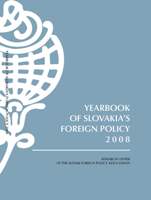Slovenské priority v Európskej únii
Slovak Priorities in the European Union
Author(s): Vladimír Bilčík
Subject(s): Politics, Geography, Regional studies, International relations/trade, EU-Accession / EU-DEvelopment
Published by: Research Center of the Slovak Foreign Policy Association (RC SFPA)
Keywords: Slovakia; 2008; foreign policy; EU; priorities;EU accession; Schengen;
Summary/Abstract: The year 2008 brought the successful fulfillment of the main integration priorities which the Slovak Republic defined at the time of its accession to the European Union in May 2004. It was a year dominated by Slovakia’s successful entry into the Eurozone and the successful ratification of the Treaty of Lisbon. On the other hand, we can discern a series of trends which cast the Slovak Republic in the role of a cautious and introverted actor in the area of European integration. In the case of the Schengen border with Ukraine, the Slovak Republic takes a stricter approach to local border traffic between Eastern Slovakia and Western Ukraine than neighboring Hungary. The issue of access to postal services or retail chains represents a serious problem for Slovakia, due to the fact that the European Commission (EC) took steps requiring the Government of the Slovak Republic to adopt a more liberal approach to the free movement of capital and services. It is clear that the current government is trying to protect the domestic energy, telecommunication, and postal market even at the cost of violating EU commitments. The aim of this contribution is to offer an analytical perspective on the fulfillment of the main political, economic, and institutional priorities of the Slovak Republic, as a member state of the European Union, while simultaneously analyzing the conduct of Slovakia and the particular positions adopted by the country’s politicians on European integration. It offers a cross-section analysis of the core political priorities of Slovakia in the EU, while also evaluating the ability of the country to formulate and promote its objectives within the Union. In addition to focusing primarily on Slovakia’s performance within the EU in 2008, in the conclusion, the contribution also attempts to offer a broader assessment of the first five years of Slovakia’s membership in the European Union.
Book: Ročenka zahraničnej politiky Slovenskej republiky 2008
- Page Range: 23-36
- Page Count: 14
- Publication Year: 2009
- Language: Slovak
- Content File-PDF

